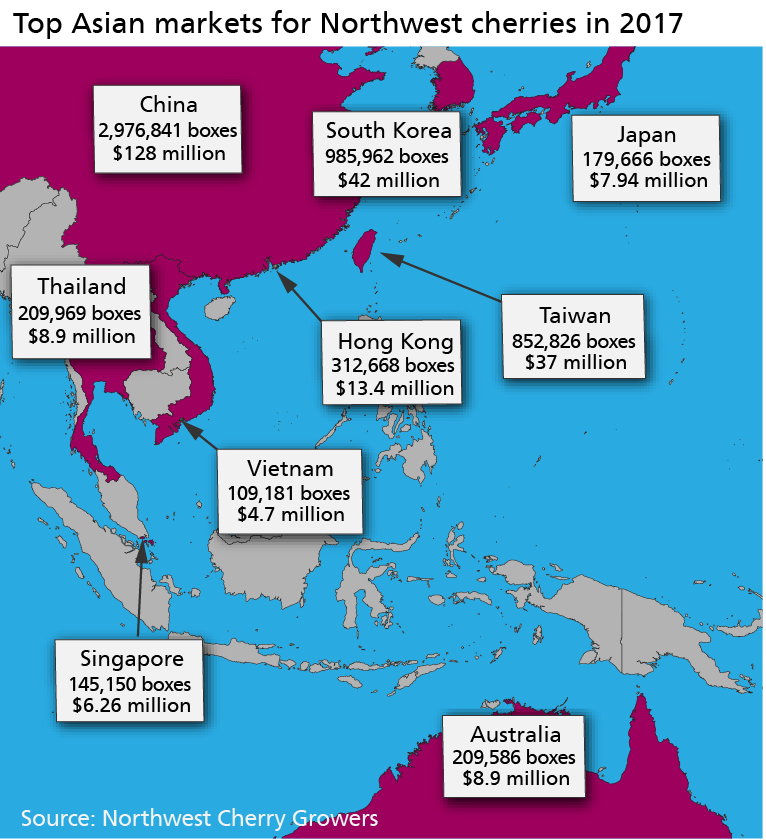By Morf Morford
Tacoma Daily Index
Tariffs are, at best, a questionable approach to international trade with unintended consequences reverberating across landscapes, industries and individual pocketbooks.
Add in a product as perishable as fresh fruit and you have major unexpected complications. Like many policies and programs related to trade and tariffs, this only gets more convoluted and messy the longer it goes on.
Durable trade relationships take years to establish, and as we are seeing, moments or a few words to destroy them.
Global trade, especially of agricultural products, has always been one of the foundations of Washington’s economy. These tariffs will hit us in more ways than we can imagine – https://www.kpq.com/sen-cantwell-trade-wars-damaging-to-washington-state/?utm_medium=email&utm_source=govdelivery or here https://www.cnbc.com/2018/07/09/beyond-boeing-washingtons-farm-workers-will-lose-big-in-trade-war.html?utm_medium=email&utm_source=govdelivery.
In Washington state, cherries are the first to ripen – and the first to encounter the buzz saw of tariffs, constantly shifting policy and uncertainty in general.
If you think cherries are perishable on your counter or in your fridge, consider them on pallets, in shipping containers or on their way across the Pacific Ocean. They have been a popular – and profitable – trade product for years – until now.
You can see the details of the cherry-flavored version of our local trade wars here – https://www.bizjournals.com/seattle/news/2018/07/20/washington-cherries-china-exports-trade-war-trump.html? or here – http://www.yakimaherald.com/news/business/local/cherries-to-china-the-pitfalls-of-tariffs/article_ebe17abc-8a4f-11e8-819a-f321d94d6730.html? or here – https://www.seattletimes.com/business/u-s-china-trade-war-could-wilt-growing-washington-farm-exports-like-cherries/?.
To put it mildly, a fifty percent tariff on cherries sold to China can not be good for business.
Trade, not aid
Most farmers are proud of what they do. The idea of their hard work literally wasting away in storage does not appeal to them. They did their share. Why should some bureaucrat in his thousand-dollar suit sitting at his desk in an air conditioned office sabotage his life’s work and way of life?
Offering to pay a subsidy for food grown and harvested – and then wasted – is seen as an insult. The unhindered free market should decide, they say. It’s a difficult argument to refute.
Government interference, especially when unnecessary, expensive and as consequential as this is, is not appreciated by anyone – customers, tax payers or producers – https://www.washingtonpost.com/opinions/congresss-latest-farm-bill-sets-a-new-standard-of-ugliness/2018/07/04/75aed658-7ee4-11e8-bb6b-c1cb691f1402_story.html?.
For more on this aspect, look here – https://www.thepacker.com/article/fruit-growers-want-trade-not-aid-government?utm_medium=email&utm_source=govdelivery or here – https://www.nwpb.org/2018/07/02/usda-secretary-says-plan-to-help-farmers-affected-by-tariffs-coming-in-september/?utm_medium=email&utm_source=govdelivery.


Where’s the beef?
Besides fruits and vegetables, beef is major export of the Pacific Northwest. And yes, like most agricultural areas, this is largely Trump-country. And they vow to stand by him no matter how much it hurts – and it will.
It will be interesting to see how principle stands up to practical reality – https://www.nwpb.org/2018/06/29/northwest-ranchers-have-beef-with-trumps-trade-wars-but-still-support-the-president/?utm_medium=email&utm_source=govdelivery.
If it seems that rural areas are suffering the brunt of these tariffs, it might be because they are (1*) – http://mynorthwest.com/1034479/washington-counties-trump-trade-war/.
Cherries, apples and wheat
One of the ironies of this situation is that this year was looking good for farmers. After several years of a dismal economy, the market was coming together – trades deals were expanding, markets were stabilizing and even the weather was favorable.
If you know anything about agriculture, you know that it, more than any other industry, is subject to a near infinite amount of variables. Trade uncertainty is still the largest difficulty.
Finding pickers is another issue. Finding mobile, seasonal, willing and capable harvesters has always been a challenge. With ever-stricter immigration enforcement, the pool of workers has shrunk dramatically. (2*)
Some agricultural areas are using prisoners as a labor resource. To put it mildly, this is a “solution” with a multitude of unforeseen consequences.
As fewer agricultural workers are available, more produce is wasted, more small farms are lost and grocery store produce prices rise.
Large farms are more likely to survive trade conflicts, and have more margin for error, but small farm owners are already struggling – and some are on the edge already – http://mynorthwest.com/1055629/reichert-tariffs-threaten-farms/?utm_medium=email&utm_source=govdelivery.
Everyone I talk to wants an economy that favors entrepreneurs and small farmers. I think we all know that we should all eat more fruits and vegetables and that fresh produce should be more affordable for those on limited budgets. I’m not a professional economist, but it seems obvious to me that we should be doing more, not less, to support small farmers, farmers markets and healthy eating.
(1*) Urban area economies, like Seattle, have a much more diversified economic base. The Tariffs will certainly impact a specific company, like Boeing, but few cities are the “company towns” they used to be.
(2*) See https://money.cnn.com/2018/06/15/news/economy/california-farmer-workers-immigration/index.html or https://www.forbes.com/sites/realspin/2012/05/17/the-law-of-unintended-consequences-georgias-immigration-law-backfires/#5afe67e4492a or https://www.economist.com/united-states/2017/07/27/if-america-is-overrun-by-low-skilled-migrants.









